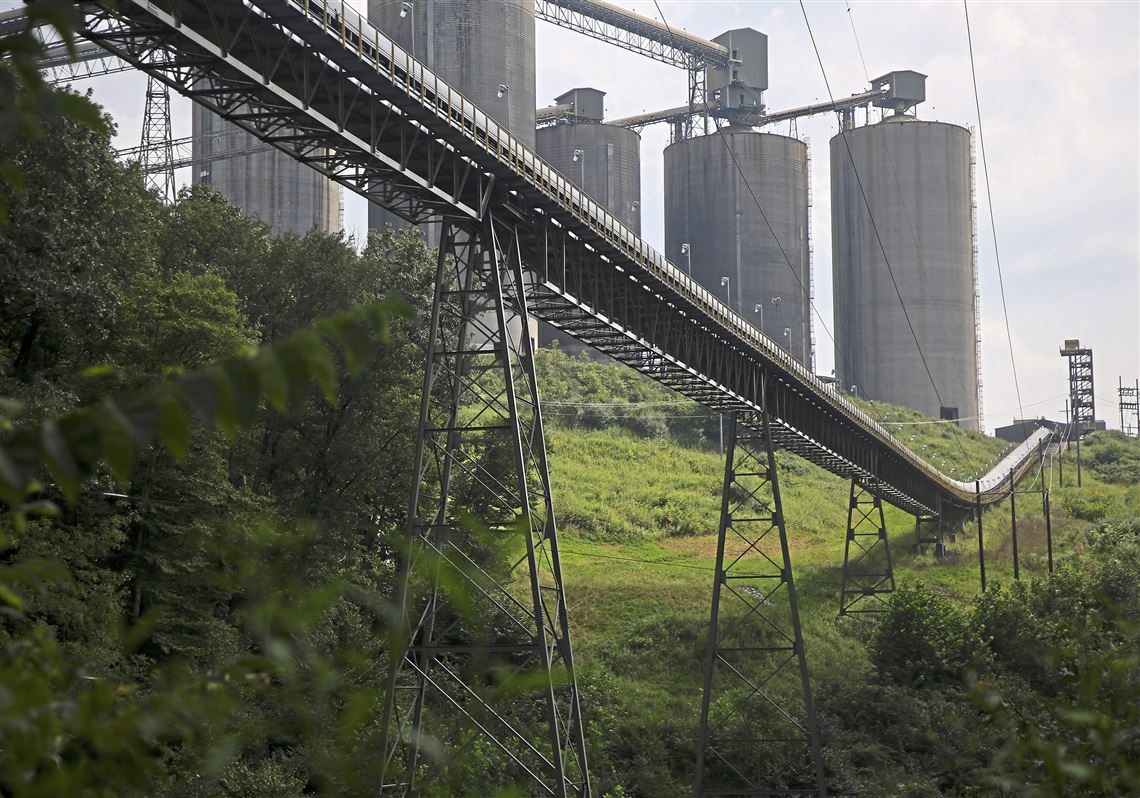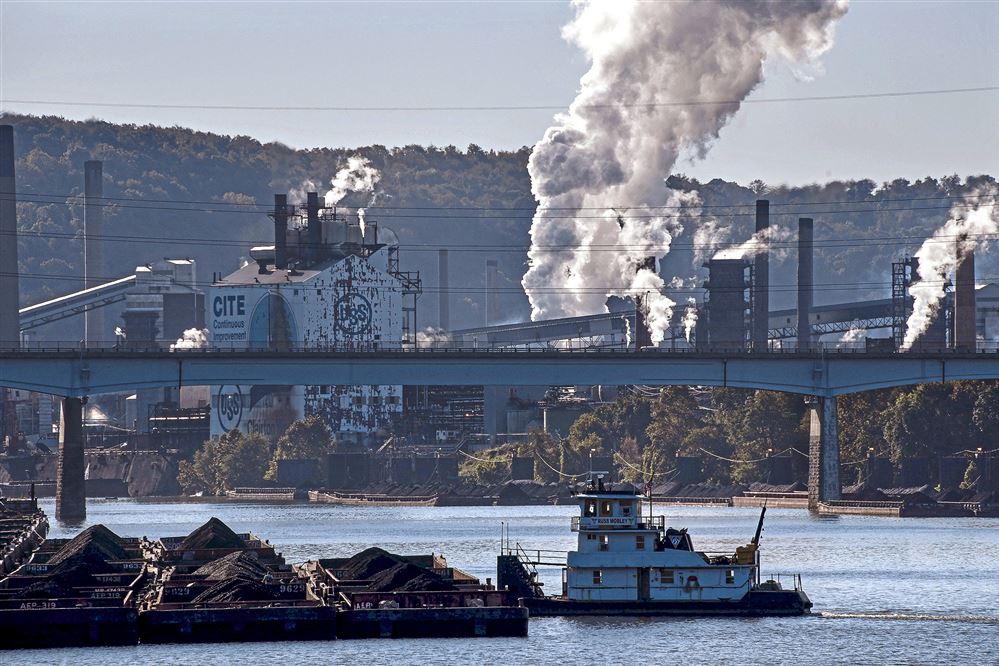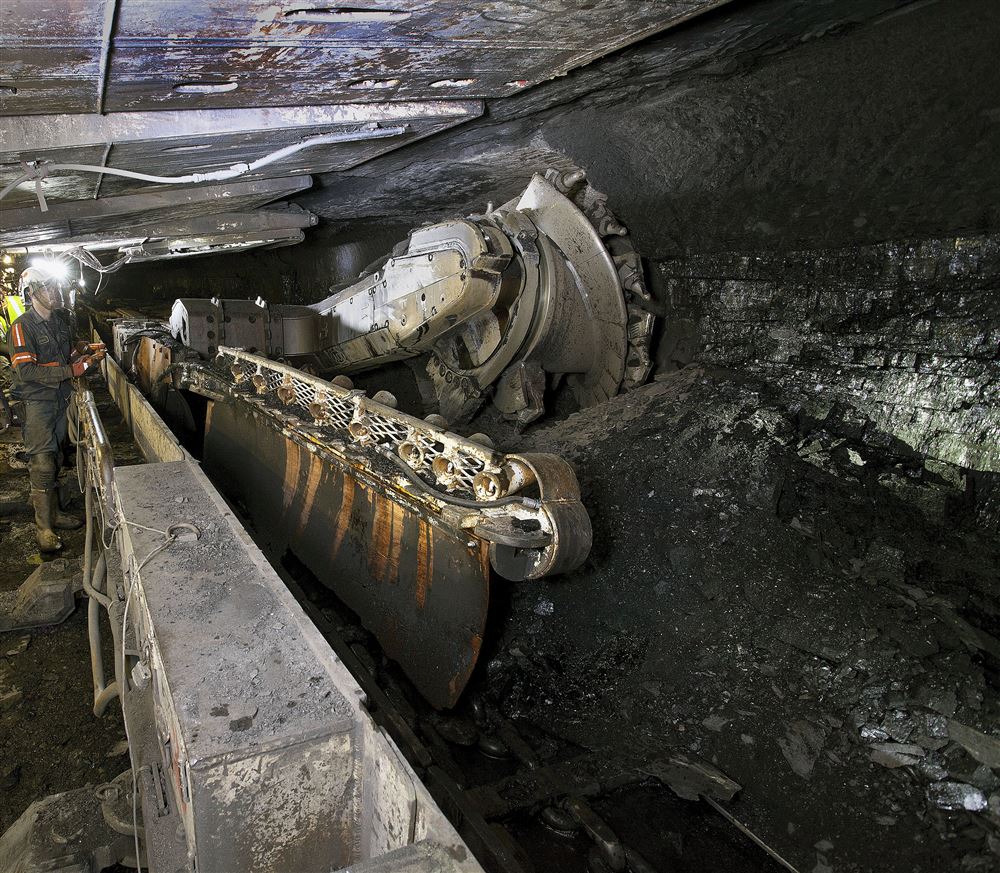Coal's Outlook Darkens as Appalachian Companies Idle Mines, Declare Bankruptcy

By Laura Legere and Anya Litvak
April 20, 2020 - Companies that produce and burn coal across Appalachia have idled mines, filed for bankruptcy and struggled to remain solvent in the past few weeks as demand for steel and energy declines.

In a 2018 photo, a conveyor at CONSOL Energy's Bailey Mine sits dormant atop a line of trees in Waynesburg, PA.
Photo by Jessie Wardarski, Post-Gazette
The broad economic collapse caused by efforts to stem the spread of the new coronavirus has put unprecedented pressure on companies dependent on a fuel that was already falling out of favor.
Last week, Moody’s Investors Service wrote that it “expects a very challenging year for the coal industry in 2020” and identified the sector as one of those most significantly affected by the economic shock caused by COVID-19.
The ratings agency downgraded long-term ratings for Pennsylvania-based CONSOL Energy Inc. and Tennessee-based Contura Energy Inc., which operates the Cumberland mine in Greene County.
This current crisis is layered on top off already formidable conditions — including a mild winter that decreased heating demand, punishing competition from low-priced natural gas, a weakened export market and growing investor concern about climate change — expected to make the industry’s access to capital increasingly expensive, Moody’s said.
The U.S. Energy Information Administration said this month that coal-fired power generation is especially vulnerable as demand for electricity shrinks.
The statistical agency now expects electricity generation from coal will fall by 20% in 2020, while coal production will fall by 22% as demand contracts, mines are idled and exports drop.
Consol, which operates the nation's largest underground coal complex in southwestern Pennsylvania, idled its Bailey Mine for two weeks after several employees tested positive for COVID-19.
Just as it brought those 500 employees back to work at the end of the two-week hiatus, CONSOL announced it is suspending operations at the adjacent Enlow Fork Mine because of low demand.
About 500 miners work at Enlow.

The Russ Mobley towboat works with barges of coal tied together on the Monongahela River with a background of the U.S. Steel's Clairton Coke Works, Wednesday, Sept. 18 2019, from the Glassport shoreline.
Photo: Darrell Sapp, Post-Gazette
On April 8, CONSOL scrapped its 2020 guidance for investors. “The extent to which the COVID-19 pandemic may impact our results will depend on future developments, which are highly uncertain and cannot be predicted,” the company said in a statement.
On April 3, Contura Energy told investors it would idle the majority of its mines for a month, although its Cumberland mine in Greene County would continue normal operations.
“As the world attempts to understand and respond to the impacts of the current pandemic, we are implementing plans that we believe will help us manage through the challenges of a distressed coal market and growing coal stockpiles alongside varied customer responses to the coronavirus,” Contura’s Chairman and CEO David Stetson said in a statement.
Coal mines were originally excluded from a list of life-sustaining businesses allowed to operate during the shutdown that Pennsylvania Gov. Tom Wolf imposed in mid-March.
The industry mobilized quickly and lobbied the state to be deemed essential. Within a few days, it succeeded.
But damage to the already vulnerable coal sector from a sudden and dramatic drop in commercial and industrial activity was by far the bigger blow.
Longview Power, which calls itself “one of the newest, most efficient and cleanest coal-fired power plants in the United States,” filed for bankruptcy April 14 — its second time since it started operating in 2011.
The West Virginia power plant blamed the move on low power prices caused by competition from cheap natural gas, a warm winter and the COVID-19 pandemic’s stamp on the economy.
The coal plant will continue to operate through the Chapter 11 process, Longview said, while the assets are transferred to its lenders. Its plans to add a natural gas power plant and solar farm to its portfolio are still on deck, the company said.
Longview’s experience illustrates the continuum of coal industry troubles that didn’t begin with the COVID-19 pandemic and aren’t likely to end with it.
The power plant used to get its coal from the 4 West Mine in Greene County, which was owned by an affiliate mining company called Mepco. But in 2018, Mepco shuttered the mine and after that Longview found it cheaper to buy coal from Contura’s Cumberland mine.
The pandemic is also complicating plans for coal companies already in the middle of bankruptcy proceedings, raising questions about whether they can successfully emerge.
Attorneys for Ohio-based Murray Energy wrote in bankruptcy court filings this month that “after suffering through quite possibly the worst market environment in its 32-year history during the first quarter of this year,” the company is now facing an “unprecedented” drain from the economic impacts of COVID-19.
The nation’s largest private coal miner entered bankruptcy in October and has been unable to find a buyer. The company warned a federal bankruptcy judge earlier this month that it might be forced to liquidate if it can’t shed health care payments for retirees.
The company was founded by Robert Murray, a prominent supporter of President Donald Trump who has pressed the administration to bail out coal companies. In Pennsylvania, the company owns the nonproducing 84 Mine in Washington County.

In a 2017 photo, a machine cuts slabs of coal inside CONSOL Energy's Bailey Mine in southwestern Pennsylvania.
Photo: CONSOL Energy Inc.
Cecil-based CONSOL sold five West Virginia mines to Murray Energy in 2013 and now finds itself a major creditor in the bankruptcy.
Mines that produce coal for manufacturing steel are also struggling through the pandemic. Moody’s wrote this month that it “expects that demand for steel will fall, causing steel producers to idle blast furnaces and reduce consumption of [metallurgical] coal.”
Those dynamics led Ohio-based Cleveland-Cliffs to indefinitely idle its AK Coal mine in Somerset County and lay off 101 workers. A public notice indicated the layoffs at the mine will be “permanent … unless a buyer is found.”
Cleveland-Cliffs is primarily an iron ore and steel producer, but it produces coal and coke for its operations.
“Significant reductions in manufacturing in the United States resulting from the COVID-19 pandemic, particularly among our automotive clients, have dramatically reduced our internal need for coal, leading to the indefinite idling of the coal mine,” spokeswoman Patricia Persico said.
The company is evaluating “longer-term options,” she said, “including a sale of the asset.”

